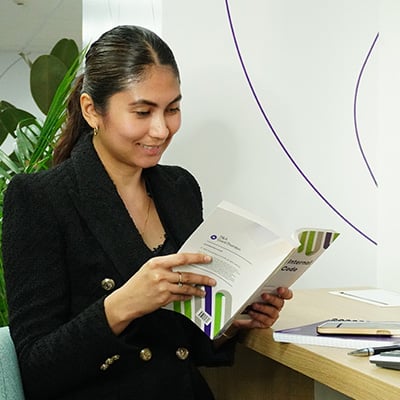-
Audit approach overview
Our audit approach will allow our client's accounting personnel to make the maximum contribution to the audit effort without compromising their ongoing responsibilities
-
Annual and short period audit
At P&A Grant Thornton, we provide annual and short period financial statement audit services that go beyond the normal expectations of our clients. We believe strongly that our best work comes from combining outstanding technical expertise, knowledge and ability with exceptional client-focused service.
-
Review engagement
A review involves limited investigation with a narrower scope than an audit, and is undertaken for the purpose of providing limited assurance that the management’s representations are in accordance with identified financial reporting standards. Our professionals recognize that in order to conduct a quality financial statement review, it is important to look beyond the accounting entries to the underlying activities and operations that give rise to them.
-
Other Related Services
We make it a point to keep our clients abreast of the developments and updates relating to the growing complexities in the accounting world. We offer seminars and trainings on audit- and tax-related matters, such as updates on Accounting Standards, new pronouncements and Bureau of Internal Revenue (BIR) issuances, as well as other developments that affect our clients’ businesses.
-
Tax advisory
With our knowledge of tax laws and audit procedures, we help safeguard the substantive and procedural rights of taxpayers and prevent unwarranted assessments.
-
Tax compliance
We aim to minimize the impact of taxation, enabling you to maximize your potential savings and to expand your business.
-
Corporate services
For clients that want to do business in the Philippines, we assist in determining the appropriate and tax-efficient operating business or investment vehicle and structure to address the objectives of the investor, as well as related incorporation issues.
-
Tax education and advocacy
Our advocacy work focuses on clarifying the interpretation of laws and regulations, suggesting measures to increasingly ease tax compliance, and protecting taxpayer’s rights.
-
Business risk services
Our business risk services cover a wide range of solutions that assist you in identifying, addressing and monitoring risks in your business. Such solutions include external quality assessments of your Internal Audit activities' conformance with standards as well as evaluating its readiness for such an external assessment.
-
Business consulting services
Our business consulting services are aimed at addressing concerns in your operations, processes and systems. Using our extensive knowledge of various industries, we can take a close look at your business processes as we create solutions that can help you mitigate risks to meet your objectives, promote efficiency, and beef up controls.
-
Transaction services
Transaction advisory includes all of our services specifically directed at assisting in investment, mergers and acquisitions, and financing transactions between and among businesses, lenders and governments. Such services include, among others, due diligence reviews, project feasibility studies, financial modelling, model audits and valuation.
-
Forensic advisory
Our forensic advisory services include assessing your vulnerability to fraud and identifying fraud risk factors, and recommending practical solutions to eliminate the gaps. We also provide investigative services to detect and quantify fraud and corruption and to trace assets and data that may have been lost in a fraud event.
-
Cyber advisory
Our focus is to help you identify and manage the cyber risks you might be facing within your organization. Our team can provide detailed, actionable insight that incorporates industry best practices and standards to strengthen your cybersecurity position and help you make informed decisions.
-
ProActive Hotline
Providing support in preventing and detecting fraud by creating a safe and secure whistleblowing system to promote integrity and honesty in the organisation.
-
Accounting services
At P&A Grant Thornton, we handle accounting services for several companies from a wide range of industries. Our approach is highly flexible. You may opt to outsource all your accounting functions, or pass on to us choice activities.
-
Staff augmentation services
We offer Staff Augmentation services where our staff, under the direction and supervision of the company’s officers, perform accounting and accounting-related work.
-
Payroll Processing
Payroll processing services are provided by P&A Grant Thornton Outsourcing Inc. More and more companies are beginning to realize the benefits of outsourcing their noncore activities, and the first to be outsourced is usually the payroll function. Payroll is easy to carve out from the rest of the business since it is usually independent of the other activities or functions within the Accounting Department.
-
Our values
Grant Thornton prides itself on being a values-driven organisation and we have more than 38,500 people in over 130 countries who are passionately committed to these values.
-
Global culture
Our people tell us that our global culture is one of the biggest attractions of a career with Grant Thornton.
-
Learning & development
At Grant Thornton we believe learning and development opportunities allow you to perform at your best every day. And when you are at your best, we are the best at serving our clients
-
Global talent mobility
One of the biggest attractions of a career with Grant Thornton is the opportunity to work on cross-border projects all over the world.
-
Diversity
Diversity helps us meet the demands of a changing world. We value the fact that our people come from all walks of life and that this diversity of experience and perspective makes our organisation stronger as a result.
-
In the community
Many Grant Thornton member firms provide a range of inspirational and generous services to the communities they serve.
-
Behind the Numbers: People of P&A Grant Thornton
Discover the inspiring stories of the individuals who make up our vibrant community. From seasoned veterans to fresh faces, the Purple Tribe is a diverse team united by a shared passion.
-
Fresh Graduates
Fresh Graduates
-
Students
Whether you are starting your career as a graduate or school leaver, P&A Grant Thornton can give you a flying start. We are ambitious. Take the fact that we’re the world’s fastest-growing global accountancy organisation. For our people, that means access to a global organisation and the chance to collaborate with more than 40,000 colleagues around the world. And potentially work in different countries and experience other cultures.
-
Experienced hires
P&A Grant Thornton offers something you can't find anywhere else. This is the opportunity to develop your ideas and thinking while having your efforts recognised from day one. We value the skills and knowledge you bring to Grant Thornton as an experienced professional and look forward to supporting you as you grow you career with our organisation.
The Revenue Memorandum Circular (RMC) No. 87-2024 aims to provide clarity on the filing of tax returns and payment of taxes under Section 3 of Revenue Regulations (RR) No. 4-2024, which implements the "Ease of Paying Taxes (EOPT) Act." It reaffirms that existing mandates requiring the use of the Electronic Filing and Payment System (eFPS) remain in effect, as these mandates are consistent with the provisions of the new regulation.
Under this regulation, all tax returns are required to be filed electronically. Taxpayers currently enrolled in eFPS are expected to continue using this platform, though they may utilize the eBIRForms facility if eFPS becomes unavailable. Manual filing is permitted only in specific circumstances, such as when electronic platforms like eFPS, eBIRForms, and Tax Software Providers (TSPs) are non-operational, or when the required tax return form is not available on these platforms. Additionally, the Commissioner of Internal Revenue may authorize manual filing for justifiable reasons.
The circular details the process for making tax payments, emphasizing that taxpayers may file returns and pay taxes electronically through eFPS, eBIRForms, or TSPs. Taxpayers required to use eFPS but not yet enrolled in the system may use eBIRForms for e-filing and pay taxes electronically or manually until their eFPS enrollment is approved.
In the event that electronic platforms are unavailable, taxpayers are permitted to manually file and pay taxes at any Revenue Collection Officer (RCO) or Authorized Agent Bank (AAB). It is important to note that RCOs are authorized to accept cash payments up to P20,000, while there is no limit on payments made via check.
The circular also addresses the submission of attachments to tax returns, stipulating that these documents must be submitted electronically through the Electronic Audited Financial Statements (eAFS) or eSubmission Facility. Should these facilities be unavailable, taxpayers may manually submit attachments to the appropriate Bureau of Internal Revenue (BIR) district office.
Furthermore, the circular eliminates the 25% surcharge previously imposed for "wrong venue" filings, ensuring that taxpayers who pay taxes at an AAB outside the jurisdiction of their registered Revenue District Office (RDO) will no longer be penalized. In instances of late filing, taxpayers are required to visit their RDO for the computation of penalties before paying the taxes at any AAB.
Finally, the circular provides specific guidelines for the issuance of checks as a mode of tax payment. The preparation of checks must be tailored according to whether the payment is made to an AAB or an RCO. In situations where an AAB’s system is offline, taxpayers are allowed to transfer to another branch of the same AAB, provided they clearly note the new branch’s name, their own name, and their Taxpayer Identification Number (TIN) on the reverse side of the check. These measures aim to enhance compliance and efficiency by simplifying the tax filing and payment process.
Please be guided accordingly.
Source:
P&A Grant Thornton
Certified Public Accountants
P&A Grant Thornton is the Philippine member firm of Grant Thornton International Ltd
As published SunStar Cebu, dated 29 August 2024



